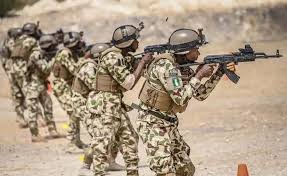THE alarming surge in insecurity across the country demands immediate attention. Between January 2024 and April 2025, the National Human Rights Commission (NHRC) documented 3,012 incidents of kidnapping and 3,584 killings which paints the picture of a nation under siege. These figures reflect the failure to prioritise security as the basis of governance. With Kaduna, Benue, Katsina, Plateau, and Borno bearing the brunt of this violence between January and June 2024, it is evident that Nigeria is grappling with a crisis that threatens its very fabric.
The government, security forces, and citizens must unite to confront this scourge head-on, for the welfare and security of the people remain the paramount responsibility of any responsible government. The causative factors of this insecurity are multifaceted, rooted in systemic failures and socio-economic challenges. The proliferation of small arms and light weapons in the hands of non-state actors, bandits, terrorists, and criminal gangs has fuelled a cycle of violence.
Despite international and regional protocols aimed at curbing arms trafficking, Nigeria’s porous borders and weak regulatory mechanisms have allowed weapons to flow freely. Bandits in the North-West, insurgents in the North-East, and armed militias elsewhere wield sophisticated firearms. The inability of federal authorities to control this proliferation is not a mere logistical failure but a betrayal of public trust. Without decisive action to curb the influx and circulation of illegal arms, the bloodshed will persist.
The escalating farmers-herders clashes, particularly in the North Central zone, have transformed states like Benue and Plateau into theatres of bloodletting. What began as resource-based conflicts over grazing land has morphed into ethnic and religious violence, exacerbated by the onslaught of armed herdsmen. These clashes are no longer mere disputes but orchestrated campaigns of terror, with entire communities razed and thousands displaced. The failure to address the root causes, land use disputes, climate-induced resource scarcity, and weak conflict resolution mechanisms has allowed this crisis to fester. The government’s tepid response, often limited to reactive measures like deploying troops after attacks, underscores a lack of proactive strategy. This must change.
The scale of killings in Nigeria is particularly shocking given that the country is not at war. Mob killings, extrajudicial executions, banditry, terrorist attacks, and even road accidents contribute to a death toll that rivals conflict zones. This normalisation of violence erodes the social contract between the state and its citizens. When people live in constant fear of abduction or death, trust in governance collapses.
The NHRC’s data is a clarion call for greater vigilance, not just from security agencies but also from communities themselves. Citizens must be empowered to report suspicious activities, while local intelligence networks should be strengthened to pre-empt attacks.
The Nigerian Army and other security forces must step up their efforts. While their sacrifices in combating insurgency are commendable, the persistent insecurity suggests gaps in strategy, coordination, and capacity. The military’s presence in hotspots like Kaduna and Bornomust be complemented by intelligence-driven operations and community engagement to dismantle criminal networks. Moreover, the welfare of security personnel, often underequipped and overstretched, must be prioritised to boost morale and effectiveness. A demoralised force cannot protect a nation under threat.
The government’s role in ensuring security cannot be overstated. Criminals wreaking havoc, whether bandits, kidnappers, or armed herdsmen, must not be treated with kid gloves. Justice must be swift and visible to deter others.
Simultaneously, the government must address the socio-economic drivers of insecurity, such as poverty, unemployment, and illiteracy, which provide fertile ground for criminality. Investing in education, job creation, and rural development can reduce the allure of crime for disenfranchised youth.
Civil societies, traditional leaders, and religious institutions also have a role to play. They must foster dialogue to de-escalate tensions, particularly in the Middle Belt, where ethnic and religious divides have been weaponised.
Community-based early warning systems, coupled with rapid response mechanisms, can save lives. The media, too, must amplify the voices of victims and hold authorities accountable without sensationalising violence.
Citizens must remain vigilant, refusing to cower in the face of terror. Security is not a privilege but a fundamental right. It is time to prioritise it before the cost in lives becomes even more unbearable.


